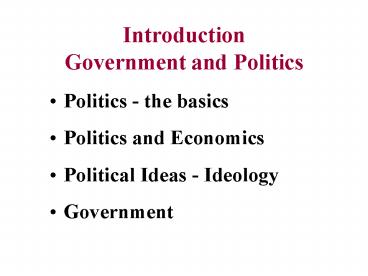Introduction Government and Politics PowerPoint PPT Presentation
1 / 20
Title: Introduction Government and Politics
1
IntroductionGovernment and Politics
- Politics - the basics
- Politics and Economics
- Political Ideas - Ideology
- Government
2
The Political Society
- No rules or laws are needed in the state of
nature. (John Locke) - Human nature competitive or cooperative
- As we formed societies, we demanded the
imposition of rules to govern innate social
conflict. All societies needs government. - Human beings are equal and endowed by nature with
certain rights. (John Locke) - Absence of government causing society to revert
to a nasty, solitary, and brutish existence.
(Thomas Hobbes) - The political systems created to impose rules
have varied throughout history.
3
From Family to Tribe to State
- Nation - sociological term
- State - political term
- State of Nature (Locke)
- Divine Right Theory (George III)
- Social Contract Theory
- Natural Rights Theory (Locke)
4
Political Theory
- Social Contract Theory
- Locke
- Humans reasonable, tolerant and cooperative
- Government by people, separation of powers
- Hobbes
- Humans nasty, mean and competitive
- Government by sovereign authority to maintain
order with no separation of power - Rousseau
- Humans corrupted by society the noble savage
- Favored government as a general will of the
people
5
Politics
- Politics is the process of resolving social
conflict over the distribution of limited
resources. - It is the process of deciding who will make the
rules about what, when, how and to whom societies
resources will be given. - Peaceful reconciliation of social and economic
differences. - Politics is ubiquitous.
6
Economics and Politics
- Money and material resources are limited.
- Human desires are limitless.
- Natural conflict occurs.
- Politicians and government institutions must step
in to resolve conflict. - Capitalism versus Communism
7
Politics and Ideology
- Ideology - a patterned set of ideas or beliefs
about a specific topic - Political Ideology - a set of ideas, values or
beliefs about the proper political and economic
system in which people should live. - The role government should play in the political
system.
8
Government
- The institutions and procedures through which a
territory and people are ruled. - The political and administrative organization of
a nation, state or locality. - Governments vary in size, structure, and
operational rules bases on many factors. - Provides for conflict resolution, defense,
safety, and economic prosperity.
9
Forms of Government
- Autocracy (One)
- Oligarchy/Aristocracy (Few)
- Democracy (Many)
- Theocracy
10
Autocracy
- A government in which a single individuala king,
queen, or dictatorrules. - King Richard I, also known as Richard the Lion-
Hearted, led Britain from 118999. - Sadam Hussein, Hitler, Stalin, and Castro
were/are all examples of dictators.
11
Oligarchy or Aristocracy
- A government in which a small grouplandowners,
military officers, or wealthy merchantscontrols
most of the governing decisions. - Louis XVI (1754 1793) was symbolic of the
French aristocracy. - The Royal Family in Saudi Arabia was an example
of an aristocratic oligarchy.
12
Democracy
- A government in which political power is vested
in the people. - Direct (classic) democracy provides for decision
making by all of the people. (Ancient Athens). - Representative democracy or a Republic provides
for representatives chosen by the people.
13
Modern Democratic Concepts
- Elitist Democracy political power is
concentrated in the hands of a small group of
powerful (wealth) individuals. - Pluralistic Democracy power is dispersed among
different power centers. - Labor organizations
- Professional associations
- Industry
- Environmentalists
14
Representative Democracy
- Today, most nation-states operate under the
concept of representative democracy. - Total Nation-States 193
- Free - 90 Partially Free - 58
- Not Free - 45
- Individuals are elected by the citizens to
represent them in the affairs of civil society. - Presidential versus Parliamentary organization is
main difference.
15
How Do Governments Govern?
- Constitutional
- Authoritarian
- Totalitarian
16
Purpose of Government in the United States
- We the People of the United States, in order to
form a more perfect Union, establish Justice,
insure domestic Tranquility, provide for the
common defence, promote the general welfare and
secure the Blessings of Liberty. - Collective Goods for the benefit of all.
- Minimalist State restrict government action to
only those things individuals can not do.
17
Principles of American Democracy Political
Culture
- American Creed
- Individual Freedom (Liberty)
- Equality - political, economic, social
- Not complete equality regulated by government
- Constitutional Democracy
- Majority rule protecting minority rights
- Voluntary consent of governed
- powered by a written charter
18
InteractionCore Ideals Institutions
- Individualism Politics
- Liberty
- Equality
- Constitutionalism Government
- Democracy
- Family
- Education
- Religion
19
The Initial DebateThe Proper Role of Government
- The Founders were divided over the proper size
and role of government. - The Federalists wanted a strong central
government to promote commerce, prevent political
strife, and protect international interests. - The Antifederalists feared that a strong
central government would endanger liberty,
thereby favoring weaker and decentralized
government.
20
The Current Debate
- The conflict continues today between
conservatives (Republicans) and liberals
(Democrats). - Conservatives (Republicans) seek a strong
government to protect economic interests, public
morality, and international interests, and
generally prefer state government action. - Liberals (Democrats) seek a strong national
government to protect civil liberties, the
environment, and to provide economic security.

